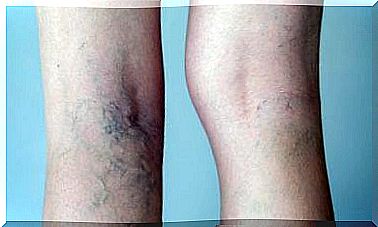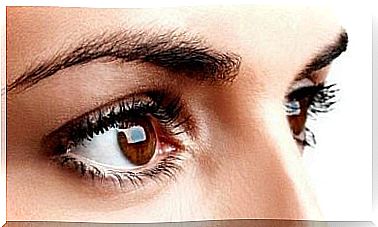What Kind Of Diseases Can Vitamin Deficiencies Cause?

Inadequate intake of food and nutrients can lead to various vitamin deficiencies and thus to various diseases. Vitamins are essential trace elements present in a wide variety of foods, albeit in small amounts. Vitamin deficiencies occur when certain vitamins are not obtained from food.
Until a few years ago, there was talk of the consequences of the absence of certain foods from the diet; however, it was later found that in reality, substances hidden in these foods are needed to maintain a healthy life. What if you don’t get enough vitamins? In this article, we want to focus on telling you what kind of diseases Vitamin Deficiencies can cause.
Diseases due to vitamin deficiencies
There are thirteen vitamins. They correspond to a group of organic compounds that work together with enzymes and are an important part of the body’s own metabolic processes. They are vital ingredients in the diet.
If vitamin deficiencies occur in the body in the medium to long term, the likelihood of developing some diseases increases. Let’s look at what diseases Vitamin deficiencies can cause:
Visual disturbances and vitamin A.
Vitamin A deficiency is associated with visual disturbances. In particular, it causes dry eyes or xerophthalmia, which over time can progress to night blindness.
Therefore, to avoid these complications, we need to ensure that our diet contains enough foods that contain vitamin A precursors, such as carotenoids. They can usually be obtained from, inter alia, the following foods:
- Egg
- Milk
- Fish like salmon
- Liver
- Dark green leafy vegetables
- Mango
- Papaya
- Tomato
- Carrot
- Pumpkin
- Corn
The daily recommendation for this nutrient depends on age and gender. According to the U.S. National Institute of Health, adult values are 900 micrograms for men and 700 micrograms for women daily.

Anemia and vitamin B12 deficiency
There is one type of anemia, also called pernicious anemia, due to a lack of vitamin B12 or cobalamin in the body. This substance contains cobalt, a mineral necessary for the production of red blood cells.
Because bacteria synthesize the effects of vitamin B12 in the body, the amount of this vitamin in humans is determined by the consumption of food of animal origin. For this reason, anyone who follows a vegan or vegetarian diet can suffer from this problem.
According to the U.S. National Institutes of Health (NIH), the daily recommended intake of cobalamin is 2.4 micrograms per day for both men and women. This proportion can be covered by various dietary supplements and especially by those who follow a diet based on herbal products.
Skin damage and vitamin C deficiency
Vitamin C deficiency can initially lead to gum bleeding and slow wound healing. Indeed, many years ago, science discovered that in the long run, a deficiency in this vitamin can cause a pathology called scurvy.
In addition to the symptoms mentioned, this disease causes fatigue, joint pain and skin damage. According to the Food and Agriculture Organization of the United Nations (FAO), its occurrence is rare because the importance of this nutrient for human well-being is widely known.
Some foods that contain vitamin C include citrus fruits, kiwi and peppers. However, it must be borne in mind that some of these foods lose their vitamin content when cooking or when exposed to high temperatures. A safe alternative to supplementing your diet is eating fruits and vegetables raw or eating vitamin C in the form of supplements.

Neurological defects and folic acid
Several studies have suggested that adequate intake of folic acid (vitamin B9) in pregnant women prevents fetal neurological defects. In addition, dietary supplements containing folic acid would also appear to have other beneficial effects, such as the prevention of congenital heart disease and cracking in the mouth.
The main sources of folic acid are dark green leafy vegetables, liver and kidneys. According to the World Health Organization, women who are trying to become pregnant and who are pregnant should consume 400 micrograms of folic acid per day for up to 12 weeks of pregnancy.
Bone fragility due to vitamin D deficiency
One of the most important functions of vitamin D in the body is to maintain bone health through proper calcium absorption. When you do not get enough of this vitamin, a person can develop various skeletal diseases such as rice disease and osteomalacia.
In humans, this vitamin is formed especially when the skin is exposed to the sun’s ultraviolet radiation. Similarly, it can be obtained from some foods of animal origin, such as eggs, milk and meat, although only 10 percent of what the body needs.
In Finland, vitamin D supplementation is recommended, especially in winter. According to the Food Agency, people who go outside during the summer months need about 10 micrograms of vitamin D a day during the winter. Older adults over the age of 75 and very few who stay outside during the summer months, on the other hand, would like to get twice the amount of vitamin D, or 20 micrograms a day, in the winter. Children under the age of 1 should receive 10 micrograms of vitamin D a day throughout the year. The intake of vitamin D in children and adolescents aged 2 to 17 years should be 7.5 micrograms per day throughout the year.
Vitamin deficiencies and related diseases: keep in mind
When the diet is balanced, Vitamin Deficiencies are unlikely. In some situations, however, recommendations for certain vitamins should be increased; such as pregnant women as well as some pathologies that can make it difficult for certain vitamins to be absorbed by the body.
If so, it is important to invest in a more varied diet, as Vitamin deficiencies can lead to many health problems. To this end, it is also advisable to consult a doctor or a nutritionist to assess the profitability of any dietary supplements and the correct dosage depending on the patient’s condition, age and condition.









